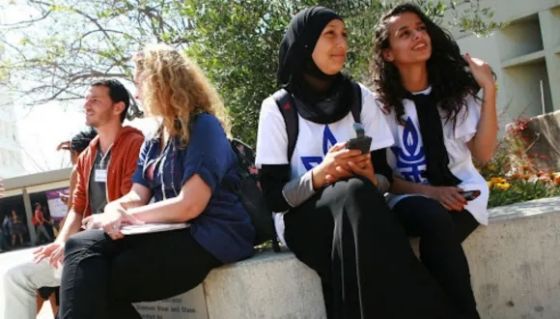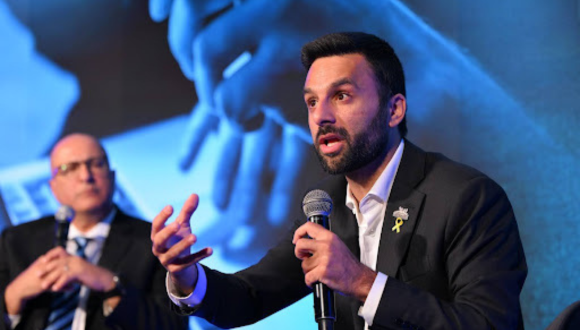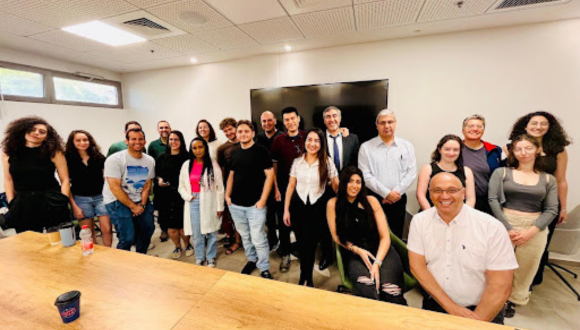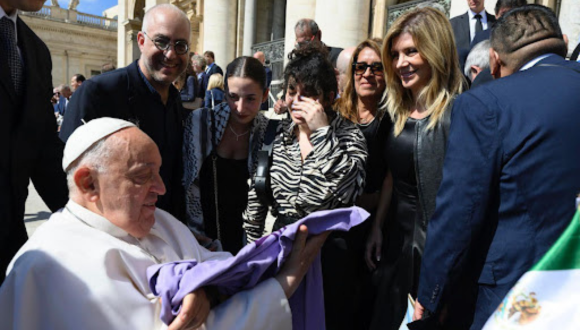
How TAU Is Navigating Campus Co-existence:
In classrooms, labs and cafeterias, Jews and Arabs confront the reality of a post-October 7 world
When the first academic term after October 7 was about to begin at Tel Aviv University (TAU), Prof. Neta Ziv, TAU’s vice president of equity, diversity and community, wasn’t sure exactly what to expect, however she knew it would be complicated. For instance, there was the lab in the School of Medicine made up of three Arab doctorates, with family members in Gaza, and five Jewish researchers, including one whose best friend was killed at the Nova Music Festival massacre and another who had family members held hostage. Furthermore, there were the many, many classrooms across campus where Jewish and Arab students studied together and were expected to continue learning in the same space.
TAU and Israeli universities had a task no other academic institution had ever had to confront to the same degree: trying to ensure coexistence, safety and wellbeing among Jews and Arabs on campus amid a tragic and violent crisis that has personally affected so many.
Preparing for the Return to Campus
Campuses across Israel are some of the most diverse spaces in Israel and where most Arab- and Jewish-Israeli citizens first really get to know one another; approximately 20 percent of students on Israeli campuses are Arab, consistent with the percentage of Arabs in Israel’s population. (While some Arabs in Israel identify as Palestinian, others do not, which is why the more general term tends to be used when referring to non-Jewish Middle Eastern Israelis.)
Regarding the return to campus on December 31, 2023, Ziv and others at TAU determined that they really needed a plan both for classrooms and public spaces that prioritized safe coexistence.
“The first thing we did was we set up a task force of Arab and Jewish faculty, as well as representatives from the Dean of Students, and we looked around and we tried to identify all the places where issues could arise.”—Prof. Neta Ziv, TAU’s VP of Equity, Diversity and Community
The University immediately hired social psychologists and organizational consultants to be on hand to assist faculties with any conflict that might arise, and more than 800 faculty members were given training on how to handle tensions in class. TAU President Prof. Ariel Porat met with all of the University’s Arab student organizations and political Jewish organizations to solicit their help in promoting coexistence on campus.

Arab-Israeli journalist Yoseph Haddad speaks at a 2024 TAU Board of Governors panel.
Ziv’s team met with all Arab faculty members as well as staff at the dormitories to reassure and offer support. For the beginning of the return to campus, many faculty members were recruited to welcome all students to campus and make them feel more comfortable returning.
“We did a lot of different things to make sure that the school year would start peacefully.”—Prof. Neta Ziv
A Faculty-Specific Approach
Ziv’s team also doubled down on their support for faculty management, empowering each faculty to do what made the most sense for their students. For example, Ziv recently attended a meeting with TAU’s School of Psychological Sciences, where they discussed how to decrease barriers for Arab students interested in clinical psychology. “We’re thinking of ways to enhance the successes of these students because we know that there are very few psychologists right now serving the Arab community in Israel,” she says.
For the Faculty of Social Sciences, which houses the School of Psychological Sciences, another main concern since October 7 has been adapting course content so that it is both relevant and sensitive to Jewish and Arab students in today’s context.

Students attend one of their first classes after the semester started on December 31, 2023
“If you teach in the social sciences … you speak immediately about students’ own lives and their lives have been changing tremendously and rapidly in the last year. So how do you maintain the high academic level, but at the same time be sensitive to their feelings about what’s going on?” asks Prof. Amal Jamal, vice dean of the Faculty of Social Sciences and head of the Walter Lebach Institute for the Study of Jewish-Arab Coexistence.
“This combination is not easy and cannot be taken for granted, and this is what we are trying to accomplish.”— Prof. Amal Jamal, Vice Dean of the Faculty of Social Sciences
Other schools and faculties are focused on alternative approaches. In the Coller School of Management, where about a third of accounting students and a quarter of management students are Arab, a pilot project will resume next academic year requiring Arabs and Jewish students to work together on group projects. “That’s the big question we have now, is how do we get back to the activities we had before October 7,” says Prof. Dotan Persitz, an inclusion advisor for Arab students in the Coller School.
Beginning the Dialogue Process
While many at the faculty level are actively finding ways to support students and bolster coexistence, there are others who are focused on confronting division by offering Jewish and Arab students a framework for coming together to hold space for the difficult truths.
The Dugri course at TAU is one example—the term “dugri” is known in both Arabic and Hebrew and means talking bluntly and without reserve to confront the hard truths and trauma of the Israeli-Palestinian crisis. The intensive TAU course, which takes place over three all-day sessions and involves 20 Arab and Jewish students from across TAU faculties, is offered by Youssef Masharawi, an Arab professor from the Department of Physical Therapy, and Uriel Abulof, a Jewish professor from the Department of Political Science.
“This is dealing, hardcore, with the issues between Arabs and Jews by discussing the truth honestly, but with a lot of respect,”—Prof. Masharawi

The Dugri class, led by Masharawi and Abulof, in session.
Another program, MiddleMeets, was conceived during a student-led TAU hackathon called The Day After. Initially, MiddleMeets was intended to bring international students and Israeli students together in conversation; however, program organizers quickly realized that dialogue was first needed at home.
The program brings together approximately 35 students from across Israeli universities. First-year TAU student Maysan Madi, who is Palestinian, is one of the participants. “It made me feel much less helpless,” she says.
“There’s something so comforting and so unique about expressing your pain to the so-called other side and that has been MiddleMeets for me.”
For the initial meeting of MiddleMeets, the Arab and Jewish groups of students met separately with a Hebrew-speaking or Arabic-speaking facilitator to discuss expectations and fears. During other meetings, shared conversation revolved around a particular theme like rights on the land, shame and guilt, and sympathy and empathy.
Regarding one meeting held at TAU, the academic advisor for the program, Prof. Elitzur Bar-Asher Siegal, recalls a particularly tense encounter between a student recently stationed in Gaza and an Arab-speaking student who asked the Jewish student if he had killed anyone.
“When you actually hear someone coming back from the war, talking with someone who blames him for genocide, and they have a sincere conversation and each one gets for a second, for a moment, that the other side is not just pure evil … I think that this is an experience that I wish everyone had for a moment,”—Prof. Elitzur Bar-Asher Siegal
The MiddleMeets initiative also led to representatives, including Madi and Bar-Asher Siegal, being invited in June to speak at the Vatican and meet the Pope. “We told him to pray for the war to end and for the hostages and for the children killed in Gaza, and we gave him the shirt of MiddleMeets and he read it in English and said thank you. He was very sweet,” says Madi.

Bar-Asher Siegal and Madi (both standing, left-hand side) offering the Pope a MiddleMeets shirt.
Madi has decided to continue with the MiddleMeets project, which is entering its second phase as organizers fundraise and work to bring together a diverse Israeli delegation with American and European students:
“I hope we get many more Palestinian and Jewish students involved, as well as international students—with what has been going on, they need to hear more from the people that live here.”—Maysan Madi
The War Isn’t Over Yet
While Ziv credits the work of the dialogue groups as well as the faculties in supporting students, she is still cautious, reflecting that the war in Gaza continues.
“Tel Aviv University is an open, democratic campus, and we are really fighting to ensure that even during periods of real tension between groups, especially now during the war, we maintain an opportunity for our students to express their views,” says Ziv. “It’s a continuing challenge, and I think it’s important to put that on the table.”
At the same time, hope persists that facilitating dialogue at TAU will have an effect and even reverberate more widely in Israeli society: “Universities are very sensitive and unique zones for Jewish and Arab relations,” says Jamal.
“Getting students to take an active role in facilitating these relationships not only helps them feel better during their studies, but they also then become messengers of better relations in their own communities.”—Prof. Amal Jamal
